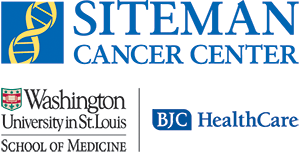660 S. Euclid Avenue, St. Louis, MO 63110

Siteman Cancer Center, based at Barnes-Jewish Hospital and Washington University School of Medicine in St. Louis, is an international leader in moving laboratory and preclinical research into clinical practice with new methods and interventions to better diagnose, treat, and prevent cancer.
More than 450 Washington University physicians and scientists treat 12,000 newly diagnosed cancer patients each year at Siteman, making it one of the largest cancer centers in the U.S. These faculty members receive $175 million annually for basic and clinical oncology research grants.
Siteman offers patients more than 400 therapeutic clinical trials, and enrolls nearly one-quarter of newly diagnosed patients in therapeutic trials. Trials that are underway include chimeric antigen receptor T cell (CAR-T cell) therapies for solid tumors, as well as hematological malignancies.
Siteman is a leading center for innovative leukemia research, with a bench-to-bedside approach that has the potential to improve survival and reduce treatment-related side effects. The National Cancer Institute has awarded Siteman leukemia researchers their third Program Project Grant (PPG), the latest totaling $14.3 million, and an $11.5 million Specialized Program of Research Excellence (SPORE) grant.
Washington University doctors and researchers at Siteman were involved in clinical trials that led to the Food and Drug Administration approval of a CAR-T cell therapy for adults with certain types of large B-cell lymphoma. Siteman and its partner pediatric oncology program, Siteman Kids at St. Louis Children’s Hospital, were among the first centers to offer CAR-T cell therapy as a new standard of care, the latter for the treatment of patients up to age 25 with a form of acute lymphoblastic leukemia (ALL). At Siteman, researchers also are working to develop other immunotherapies that attack cancer, including CAR-T cell therapy for multiple myeloma.
A second, $10.4 million SPORE grant at Siteman is funding the development of new approaches to detect and treat pancreatic cancers.
As a leader in sequencing the genomes of cancer patients and their tumor cells, Siteman scientists have a unique perspective on the genetic alterations that drive the development of cancer. Siteman researchers and clinicians also are engaged in studies to determine what drugs will work best for patients based on the genetic signatures of their tumors, including breast, lung, endometrial, and other forms of the disease.
Public health and prevention scholars are integrating evidence-based cancer control initiatives into clinical and public health practice and are exploring individual and social ways to improve tobacco control.
Engineers in optical imaging are developing goggles that use near-infrared light to assist surgeons in visualizing tumors. The investigational technology relies on a biomarker that binds to cancer cells, causing the tumor to “light up” and become visible to surgeons wearing the goggles.
Timothy Eberlein, MD, has served as Siteman’s director since 1998. In 2017, Christina Longnecker, JD, MBA, BSN, RN, joined Siteman’s leadership team as vice president of oncology services, and Nick Fisher, MBA, joined as executive director of research and business administration. They and the rest of the Siteman team are committed to providing the best cancer care to patients today and conducting groundbreaking research to improve cancer care for patients tomorrow.
Website: Siteman Cancer Center
Contact:
Melissa Haley
314-747-8064

Facebook
Hoosier Cancer Research Network on Facebook
Linked In
You Tube
Twitter